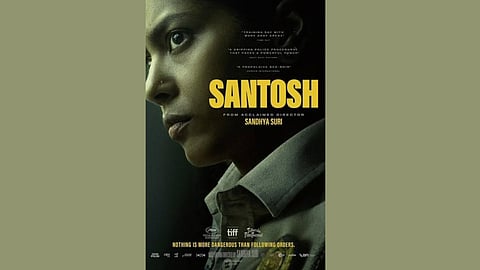“Let us be seen”: Sunita Rajwar’s heartbreak over ‘Santosh’ not releasing in India
In a modest home tucked away from the glitter of big-budget premieres, actor Sunita Rajwar sits with a heaviness she can’t quite shake. Her phone buzzes with congratulations from friends and fellow artists across the world. Santosh, the film she poured herself into, has been selected as the UK's official entry to the Oscars. Critics have called it powerful, nuanced, necessary.
But back home, where the story unfolds in India, the film remains unseen.
Sunita Rajwar: “I’m sad. It’s one of my best performances"
"It’s a big role. A different kind of role. And no one here will get to watch it,” she added.
Directed by Sandhya Suri, Santosh is an internationally celebrated co-production that explores the tension between justice and institutional rot.
Set in rural north India, it follows Shahana Goswami’s character: a young Hindu widow who inherits her husband’s job as a constable through a government scheme. Thrust into a system designed to crush rather than uplift, she finds unlikely camaraderie with Inspector Sharma, a veteran detective with a tough exterior and a guarded heart, played by Rajwar.
“I loved playing her,” Rajwar says. “She’s rough-edged, but there’s depth. It’s rare that we get to play women like this, women who are shaped by the system, hardened by it, and yet capable of change.”
But Santosh has been caught in a bureaucratic chokehold. India's censor board has asked for extensive edits. In fact, there were so many edits, Rajwar says, “that it’s not possible.”
The result was a quiet, unofficial ban. While global audiences applaud, Indian viewers are left in the dark.
“We act because we want to move people,” she says. “Every artist wants their best work to be seen. You hope someone watches you and says, ‘I didn’t know she could do that.’ That’s how we grow. That’s how we survive.”
Rajwar will next appear in the popular Prime Video series Panchayat 4, but Santosh holds a special place in her heart, not just for its critical acclaim, but for the conversations it could have sparked at home. About caste, gender, power, and the cost of silence.
“They’re trying,” she adds about the filmmakers. “But we don’t know if it’ll happen. Maybe one day.”
Until then, Santosh exists as a film that speaks truth to power, just not in the place that most needs to hear it.
For more updates, join/follow our WhatsApp, Telegram and YouTube channels.

